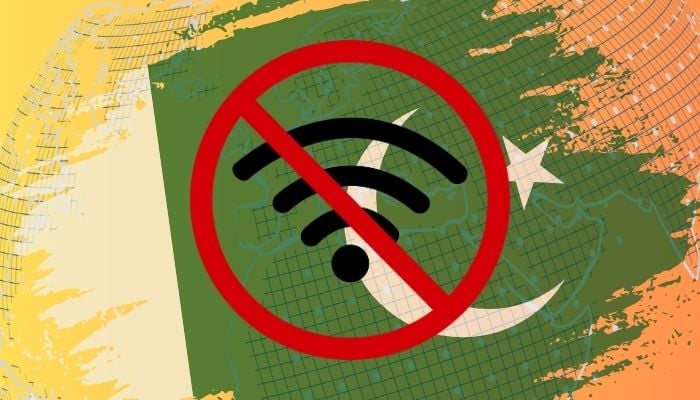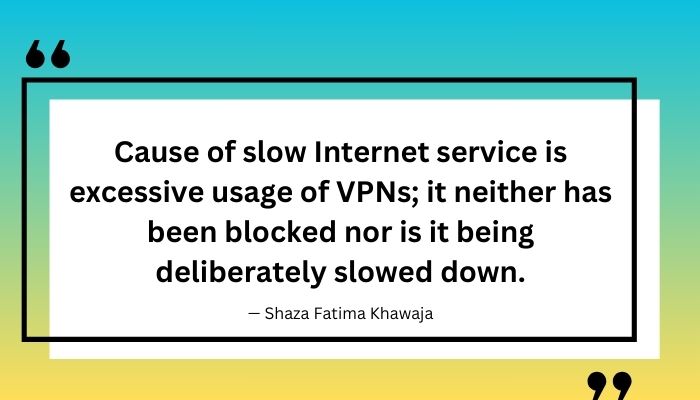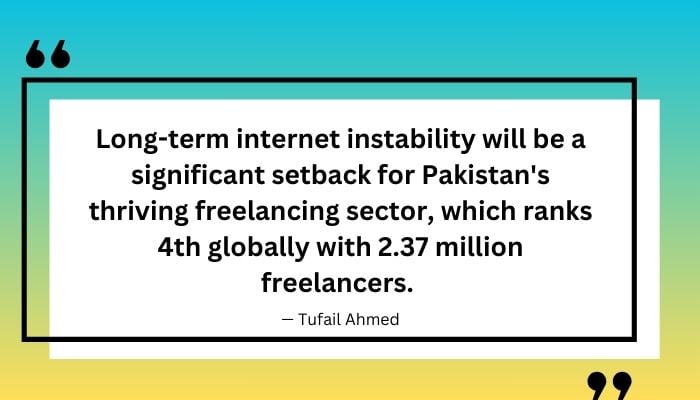
An unprecedented internet outage in Pakistan has been ongoing for the past few weeks, frustrating millions of users and raising serious concerns. The frequent and prolonged outages have impacted not only individuals but also businesses that rely on online services in the country.
The tech industry has expressed alarm, warning of potential economic losses of up to $300 million.
Tech experts link this disruption to government efforts to enhance security by installing internet firewalls at the country’s main gateways in order to monitor, filter, manage, and restrict access to websites and social media platforms.
However, internet service providers argue that these measures have stifled the digital economy.
Speaking to Gadinsider, Pakistan Freelancer Association CEO Tufail Ahmed stated: “Internet instability is severely affecting not only freelancers but also all internet-dependent businesses, IT companies, and startups in Pakistan. Their operations rely entirely on the internet, and their livelihoods depend on the income generated through it.”
Impact on businesses and freelancers
The disruptions have significantly affected various sectors, including call centres, e-commerce, and online businesses. Some companies are now considering relocating side office operations to countries with stable internet services.
Freelancers and international businesses that rely on secure, steady internet services have also felt the impact of these disruptions.

Pakistan Business Council (PBC) CEO Ehsan Malik told Gadinsider that these internet disruptions are shaking the confidence of multinationals about their operations in Pakistan. "Connectivity issues are forcing companies to think twice about establishing or continuing their back offices here," he added.
Consequences of the disruption
The outage has tarnished Pakistan's reputation as a hub for digital entrepreneurship, posing a serious threat to the country’s economic stability. In particular, international businesses and freelancers have suffered greatly from the enhanced surveillance measures, including restrictions on virtual private network (VPN) usage, which are essential for secure, uninterrupted internet access.
"The economic impact of internet instability cannot be overstated. According to the World Economic Forum, a complete internet shutdown in Pakistan results in a loss of approximately $50 million. Imagine the cumulative effect of prolonged instability on productivity and the freelancing industry over these past few weeks, which earned $3.5 billion from 2022 to 2023," Tufail added.
Industry leaders have warned that businesses may shift operations abroad as they struggle to compete globally under the current internet constraints.
Highlighting the consequences for freelancers, Malik said: "Reliable internet connectivity is crucial for their work. Without it, they cannot deliver services and earn a living. This not only affects their livelihoods but also undermines Pakistan's reputation as a hub for freelancing and outsourcing."
Larger software development companies are also feeling the effects of the disruptions. If these issues continue, they could have long-term consequences for the country's digital economy, he added.
According to the Pakistan Software Houses Association (P@SHA), these disruptions are akin to a direct, aggressive attack on the industry’s viability, causing financial losses estimated at up to $300 million.
Govt blames VPN use
While industry players link the ongoing disruptions with the installation of firewall, State Minister for Information Technology Shaza Fatima Khawaja clarified in a recent statement that the cause of slow internet service is excessive VPN usage; "it has neither been blocked nor deliberately slowed down".
She added that the government is working towards resolving the issue and improving internet services in Pakistan. Khawaja stated that the slow internet service in the country is due to the blocking of some social media apps, which led people to use VPNs, thereby slowing down internet speed.
It should be noted that the Pakistan Telecommunication Authority (PTA) has reportedly decided to introduce a new policy regulating VPN usage nationwide, following a significant surge in demand.
However, the state minister assured that the government is working on resolving the issue, and the situation will improve in a few days. A digitisation commission will be formed to promote the digitisation of the economy.
Khawaja further clarified that there is no intention to reduce or block internet speeds, but the overload on internet traffic has caused the slowdown.

According to Top10VPN, a VPN service provider, the surge in VPN demand was primarily driven by the blocking of the social media platform X (formerly Twitter), leading to a 131% increase in usage.
2.3m freelancer community hit badly
Moreover, a press release issued by the Pakistan Association of Freelancers has drawn attention to the need for authorities to address the ongoing issues affecting the country's freelancing community of over 2.3 million, including students, educated housewives, and others dependent on stable internet for their livelihood.
In a conversation with Gadinsider, Ahmed emphasised: "Long-term internet instability will be a significant setback for Pakistan's thriving freelancing sector, which ranks 4th globally with 2.37 million freelancers. If the internet remains unstable, it will damage our reputation and hinder the growth of this critical industry."
The serial disruptions have led to significant revenue losses, posing a threat to the growth and reputation of the freelancing industry.
The Wireless and Internet Service Providers Association of Pakistan (WISPAP) reported the government's surveillance efforts have unintentionally crippled the nation's digital economy.
According to WISPAP, internet speeds have dropped by 30 to 40% in recent weeks, impacting businesses and individuals who rely on reliable connectivity.
















